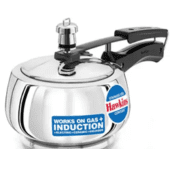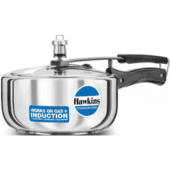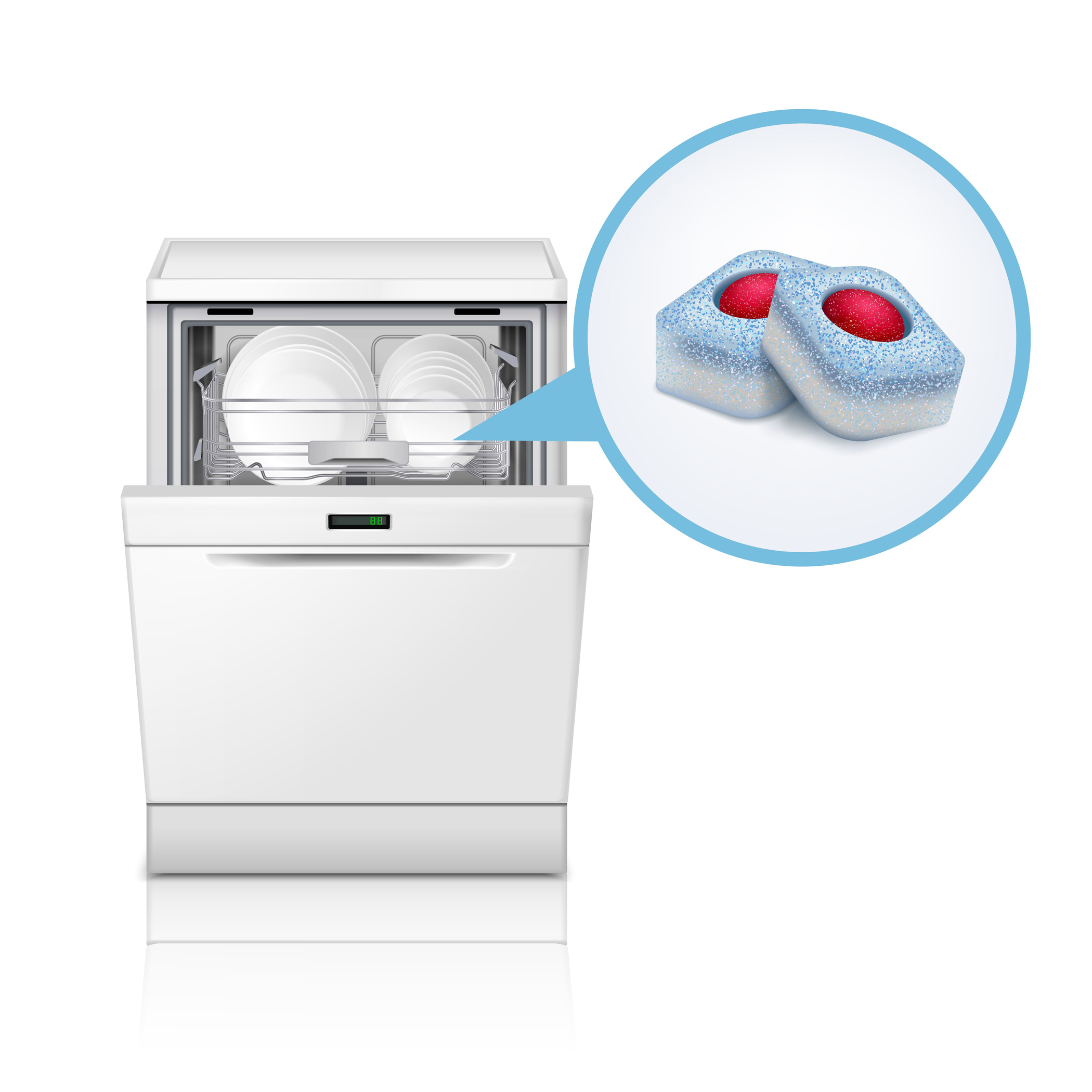Table of Contents
ToggleAdvantages and Disadvantages of Aluminum Pressure Cooker
The pressure cooker is popular for its ability to cook food by utilizing the heat in very less time as compared to cooking with any open utensil. In relation to that comes the most common thought to be, which is the best aluminum or steel pressure cooker. Aluminum and steel pressure cookers are the top picks in Indian kitchens due to their ability to cook food very fast. Cooking meat using a pressure cooker takes very less time when compared to the time taken by other cookware like a pan for the same dish.
- It is important to know the Disadvantages of Aluminum Pressure cooker to make the right choice for your requirements. This article will walk you through all the important parameters you have to consider while buying an aluminum or stainless steel pressure cooker. Let us understand why an aluminum pressure cooker is not safe to use.
Why aluminum pressure cooker is not safe to use?
Most people don’t know that the choice of their pressure cooker affects their health very well. The surface of the aluminum pressure cooker is reactive to acidic food during and after the cooking. This is extremely dangerous for our health. That’s why Expert recommends using a good quality stainless steel pressure cooker for daily cooking. Cooking in the stainless steel pressure cooker is a healthy option and has a very less chance of burnt food. Stainless steel pressure cookers are the best for beginners.
Aluminum Pressure Cooker have some downsides:
- First, they can react with certain foods, like acidic or alkaline ones, which can change how they taste and look.
- Second, aluminum is a soft metal that can get dented and warped easily, making it less durable. There’s also a worry that aluminum can get into the food during cooking, which may not be healthy.
- Lastly, heat might not spread evenly in aluminum pressure cookers, causing some parts to be hotter than others.
Advantages of aluminum pressure cooker
Following are the Advantages of the aluminum pressure cooker:
- Lower Price
The very first Advantages of the aluminum pressure cooker is that Aluminum pressure cookers are comparatively cheaper due to how abundant this metal is available and how easy it is to manufacture it.
- Light in weight
The second Advantages of the aluminum pressure cooker is that It is more lightweight than stainless steel and other metals which are used in kitchen utensils. which makes aluminum pressure cookers easier to handle and maneuver compared to pressure cookers made from heavier materials like stainless steel. This can be particularly beneficial for individuals who may have difficulty lifting or carrying heavier cookware.
- Good conductor of heat
The third Advantages of the aluminum pressure cooker is that Aluminum is a good conductor of heat. That means it heats up more quickly than stainless steel pressure cooker under the same circumstances. You may save a small amount of time every time while cooking.
- Required less fuel
As aluminum cookers are good conductors of heat, cook the food in less time as compared to stainless steel cookers. So, it saves cooking fuel and time.
- Cost is shocking
It is more cost-effective. You can find two or three aluminum pressure cookers at the same price as one stainless steel pressure cooker. That’s why, it is widely used by lower and middle-class families.
- Ideal for large cooking
Industrial-type pressure cookers are made from aluminum because of their effective heat evenly and cook in large quantities.
- Quick Pressure Building
Due to its superior heat conduction properties, aluminum pressure cookers can generate and build pressure faster than some other materials. This allows for quicker cooking times, saving energy and reducing overall cooking time.
- Easy to Clean
Aluminum pressure cookers are typically easy to clean due to their non-stick properties and smooth surfaces. Food residues and stains are less likely to stick to the surface, making the cleaning process quicker and more convenient.
- Versatility
Aluminum pressure cookers are compatible with various cooking methods, including stovetops, gas burners, and electric cookers. They can be used for a wide range of cooking tasks, from boiling and steaming to slow cooking and canning.
- Faster Cooling
The last Advantages of the aluminum pressure cooker is that Aluminum pressure cookers cool down more quickly after cooking compared to materials like stainless steel. This feature can be advantageous when time is a factor, allowing for faster release of pressure and quicker access to cooked food.
Disclosure: Some of the links below are affiliate links. This means that, at zero cost to you, I will earn an affiliate commission if you click through the link and finalize a purchase.
We have a list of One of the best Pressure cookers you can buy.
- Color: Silver
- Brand: Pigeon
- Material: Stainless steel
- Closure Type: Outer Lid
Check Now!!
- Color: Silver
- Brand: Prestige
- Material: Stainless steel
- Closure Type: Outer Lid
Check Now!!
- Color: Silver
- Brand: Pigeon
- Material: Stainless steel
- Closure Type: Outer Lid
Check Now!!
- Color: Silver
- Brand: Butterfly
- Material: Stainless steel
- Closure Type: Outer Lid
Check Now!!
- Color: Silver
- Brand: Hawkins
- Material: Stainless steel
- Closure Type: inner Lid
Check Now!!
- Color: Silver
- Brand: Hawkins
- Material: Stainless steel
- Closure Type: inner Lid
Check Now!!
Disadvantages of aluminum pressure cooker
Following are the Disadvantages of Aluminum Pressure Cooker :
- Light in weight
First Disadvantages of Aluminum Pressure Cooker is that it is very lightweight and is prone to warping and distorting more easily than other materials like stainless steel. Some bumps of heat warping may occur in the lower end of the product. This led to the misalignment of the pressure cooker while placing it on any flat surface.
- Short Life Span
The other side of the pressure cooker that is so cost-effective is that aluminum tends to be less durable as compared to stainless steel. You may get an aluminum cooker at lower prices but after a year, you may need to replace it with the new one. The same thing is not to happen with the long-lasting and durable pressure cooker made from stainless steel or other robust materials.
- Tends to get Stains
The other Disadvantages of Aluminum Pressure Cooker is a metal that gets stains over time. These stains occur inside the cooker. It is advised to buy an Appliance that is Robust and has very less wear and tear or other signs of aging through repeated use.
- Prone to food burning
The aluminum cooker cooks food very fast. Whenever attention is not given to cooking, there is a big chance of serving burnt food. This is also a Disadvantages of Aluminum Pressure Cooker. Some parts of the food stick at the bottom of the surface. So careful cooking and attention are required.
- Reactivity
Aluminum is a metal that reacts very easily with acidic food like salt, and tomato. It results in a metallic taste. This acidic reaction tends the aluminum to get stains over time.
- Temperature control
Aluminum pressure cookers do not have the same level of control for temperature as a stainless steel cookers. This can result in burnt food or uneven cooking.
- Noisy
Aluminum cookers are louder than other metals.
- Not good for the health
Aluminum cookers are not Health friendly because they react to acidic food like tomatoes and salt. It creates so many problems in our bodies.
- Hard-to-clean stains
Over time, an aluminum pressure cooker tends to have a dark layer on it that makes it look so old and worn out. It requires a lot of effort to clean.
- Lost shine after a few uses
These pressure cooker looks very shiny when you buy it. But when the initial polish washed away, it is start looking dull and old.
- Uneven Heat Distribution
Aluminum has relatively poor heat conductivity compared to materials like copper or stainless steel. This can result in uneven heat distribution within the pressure cooker, leading to hot spots and areas that may cook food less efficiently. It may require more frequent stirring or monitoring to ensure even cooking.
- Not Suitable for Induction Cooktops
Most aluminum pressure cookers are not compatible with induction cooktops, which require a magnetic base. Aluminum is not magnetic and therefore cannot generate heat when used with induction technology. If you have an induction cooktop, you’ll need to ensure that your pressure cooker has a compatible base material, such as stainless steel.
- Limited Appearance Options
Aluminum pressure cookers often have a plain, utilitarian appearance. Unlike stainless steel pressure cookers, which can have polished or brushed finishes, aluminum models typically have a basic, unadorned look. This may not be a significant concern for everyone, but some users prefer cookware with a more aesthetically pleasing design.
- Relatively Lightweight
While the lightweight nature of aluminum can be an advantage for some, it can also be a disadvantage for others. Some users prefer a heavier pressure cooker as it provides better stability and reduces the risk of tipping over. Additionally, a lightweight pressure cooker may be more prone to accidental bumps or movements during cooking.
The Environmental Impact of Aluminum Pressure Cookers
- Resource Extraction
Aluminum is derived from bauxite ore, which requires extensive mining operations. The extraction process can lead to deforestation, habitat destruction, and soil erosion. Additionally, the energy-intensive extraction process contributes to greenhouse gas emissions and can hurt local ecosystems.
- Energy Consumption
Aluminum production requires a significant amount of energy. The extraction, refining, and processing of aluminum require large amounts of electricity, which is often generated from non-renewable sources such as coal or natural gas. High energy consumption contributes to carbon dioxide emissions and the depletion of fossil fuel resources.
- Manufacturing Process
The manufacturing of aluminum pressure cookers involves multiple steps, including shaping, welding, and assembling. These processes consume energy and may involve the use of chemicals and materials that have environmental impacts. Additionally, the transportation of raw materials and finished products adds to the carbon footprint of aluminum pressure cookers.
- Durability and Longevity
Aluminum pressure cookers are generally lightweight and may not have the same level of durability as pressure cookers made from materials like stainless steel. If an aluminum pressure cooker gets damaged or wears out quickly, it may result in a shorter product lifespan and a higher frequency of replacements. This contributes to increased resource consumption and waste generation.
- Recycling Potential
Aluminum is highly recyclable, and recycling aluminum pressure cookers can significantly reduce the environmental impact associated with their production. However, it’s worth noting that not all aluminum pressure cookers are easily recyclable due to other materials incorporated in their construction, such as rubber or plastic components. Proper recycling infrastructure and consumer awareness are essential to maximizing the recycling potential of aluminum pressure cookers.
- End-of-Life Disposal
Improper disposal of aluminum pressure cookers can lead to environmental issues. If they end up in landfills, aluminum cookers may contribute to the release of greenhouse gases as they break down. Encouraging responsible disposal methods, such as recycling or proper waste management, can help mitigate these impacts.
Conclusion
Aluminum pressure cookers offer several advantages that make them a popular choice for many individuals. Their lightweight nature, excellent heat conduction, cost-effectiveness, and versatility make them a convenient and efficient option for various cooking tasks. Additionally, aluminum pressure cookers are easy to clean and promote efficient energy use, saving time and resources in the kitchen.
- However, it’s important to consider potential drawbacks such as reactivity with certain foods and concerns about durability. By weighing the advantages and disadvantages and considering personal preferences and needs, individuals can make an informed decision on whether an aluminum pressure cooker is the right choice for their culinary endeavors. Whether you opt for an aluminum pressure cooker or explore alternatives, investing in a high-quality pressure cooker can significantly enhance your cooking experience and simplify your meal preparation.
- You can read my other article here.
FAQs
Q: What is an aluminum pressure cooker?
An aluminum pressure cooker is a kitchen appliance used for cooking food under high pressure and temperature to reduce cooking time.
Q: Are there any side effects associated with using an aluminum pressure cooker?
There are concerns about potential side effects related to aluminum exposure when using aluminum pressure cookers.
Q: Can aluminum from the pressure cooker leach into food?
There is a possibility that small amounts of aluminum can leach into food, especially when cooking acidic or high-temperature foods. However, the amount of aluminum that leaches into the food is generally considered to be minimal.
Q: Are there alternative materials for pressure cookers with lower aluminum leaching risks?
Yes, pressure cookers made from stainless steel or other non-reactive materials are available and are considered to have lower risks of aluminum leaching. These can be a good alternative for individuals concerned about aluminum exposure.
Q: Should individuals with certain health conditions avoid using aluminum pressure cookers?
If you have kidney problems or other health conditions that require you to restrict aluminum intake, it may be advisable to choose alternative cookware or consult with a healthcare professional for personalized guidance.
Q: What are the health risks of consuming aluminum?
High levels of aluminum intake have been associated with health concerns such as neurological disorders, kidney problems, and bone disorders. However, it’s important to note that the current scientific evidence regarding the health risks of aluminum is inconclusive.
Q: What are the advantages of using an aluminum pressure cooker?
Aluminum pressure cookers are generally affordable, lightweight, and heat up quickly. They are also good conductors of heat, which helps in cooking food faster.
Q: Are there any disadvantages to using an aluminum pressure cooker?
Yes, aluminum pressure cookers have a few disadvantages. They can react with acidic or alkaline foods, affecting taste and appearance. Aluminum is also a soft metal that can get dented and warped easily, reducing its durability. There are concerns about the potential transfer of aluminum into food, which may pose health risks if consumed in excess. Additionally, heat distribution in aluminum pressure cookers may be uneven, leading to hot spots during cooking.
Q: Can I cook all types of food in an aluminum pressure cooker?
Aluminum pressure cookers are suitable for cooking a wide range of foods. However, it is recommended to avoid highly acidic or alkaline foods, as they may react with the aluminum and affect the taste and appearance of the dish.
Q: Are there safety considerations when using an aluminum pressure cooker?
Yes, it’s important to follow the manufacturer’s instructions and safety guidelines when using an aluminum pressure cooker. Make sure to release the pressure fully before opening the cooker to avoid accidents. It’s also crucial to check the condition of the cooker for any dents or damage that may affect its safety.
Q: Can I use an aluminum pressure cooker in a dishwasher?
It is generally not recommended to put aluminum pressure cookers in the dishwasher, as harsh detergents and high temperatures can potentially damage the aluminum material. It’s best to clean them by hand using mild soap and warm water.












